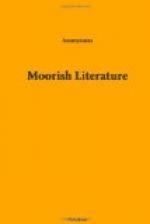One magnificent period in literature unfolded itself in the eleventh century A.D., in the little courts of Seville, of Murcie, of Malaga, Valence, Toledo, and Badajos. The kings, like El Nis Sasim, El Mo’hadhid, El Mishamed, Hbn Razin, rank among the best poets, and even the women answered with talent to the verses which they inspired. They have preserved the names and the pieces of some of them: Aicha, Rhadia, Fatima, Maryam, Touna, and the Princess Ouallada. Greek antiquity has not left us more elegant verses, nor elegies more passionate, than these, of which but a small portion has been saved from forgetfulness in the anthologies of Hbn Khayan, Hbn el Abbar, Hbn Bassam de Turad-eddin, and Ibn el Khatib el Maggari. They needed the arrival of the Berbers to turn them into Almoran. Those Berbers hastened there from the middle of Sahara and the borders of Senegal to help the cause of Islamism against Spanish rule, as it was menaced through the victories of Alfonso of Castile. The result would have been to stifle those free manifestations of the literary art under a rigorous piety which was almost always but the thin varnish of hypocrisy.
To the Almoravides succeeded the Almohades coming from the Atlas of Morocco. To the Almohades, the Merias coming from Sahara in Algeria, but in dying out each of these dynasties left each time a little more ground under the hands of the Christians, who, since the time in Telage, when they were tracked into the caverns of Covadonga, had not ceased, in spite of ill fortune of all sorts, to follow the work of deliverance. It would have been accomplished centuries before if the internal struggle in Christian Spain in the fourteenth and fifteenth centuries had not accorded some years of respite to the kingdom which was being founded at Granada, and revived, although with less brilliancy, the splendor of the times before the twelfth century.
In the course of the long struggle the independent Christians had not been able to avoid feeling in a certain measure something of the influence of their neighbors, now their most civilized subjects. They translated into prose imitations of the tales such as those of the book of Patronis, borrowing from the general chronicles or in translations like the “Kalila and traditions, legendary or historic, as they found them in the Dimna,” or the book of “The Ruses of Women,” in verse.
In their oldest romances—for instance, that of the “Children of Sara,"[5] and in those to which they have given the name of romances fronterizos, or romances of the frontier—they give the facts of the war between the Mussulmans and the Christians.
[5 ] T. Ramon Manendez Pidal. La legende de les Infantes de Sara. Madrid, 1896. 8vo.




